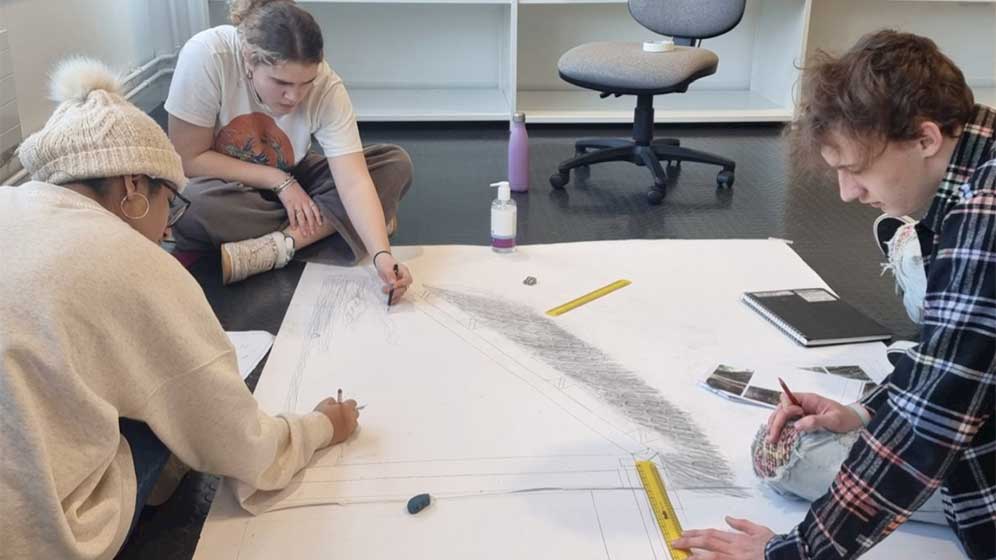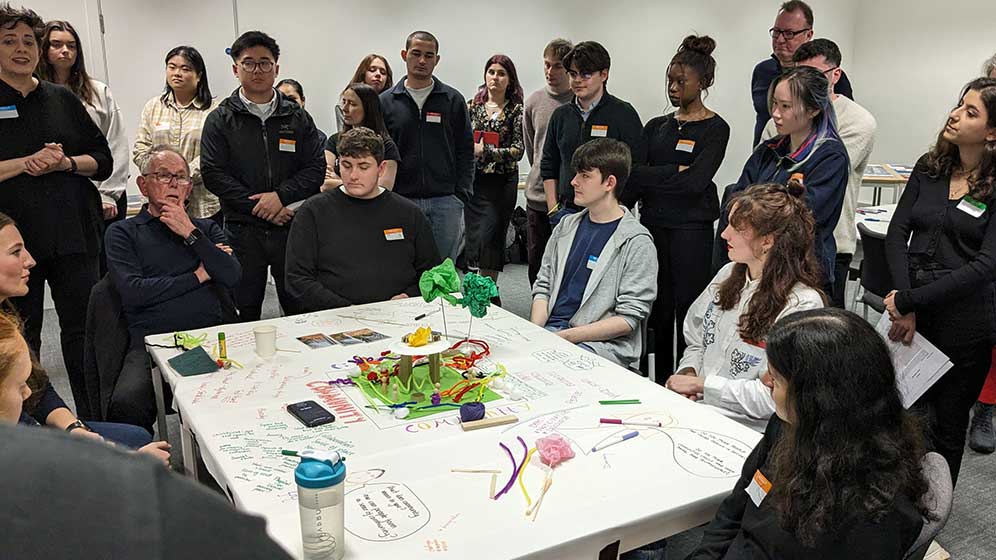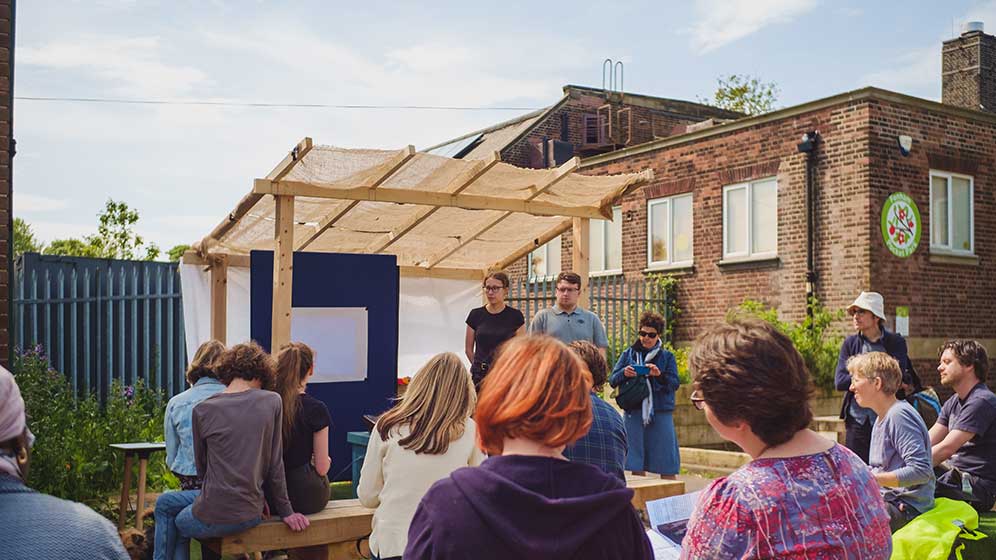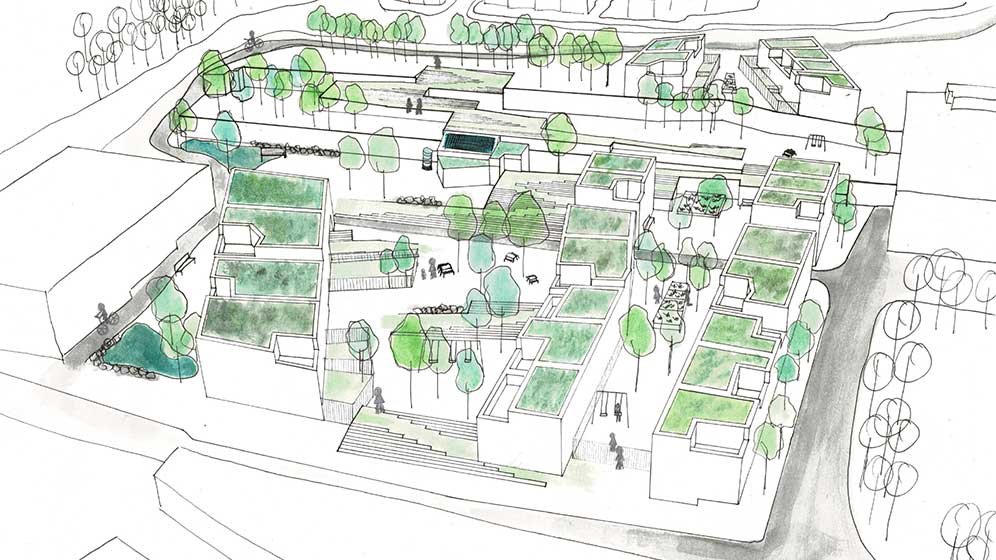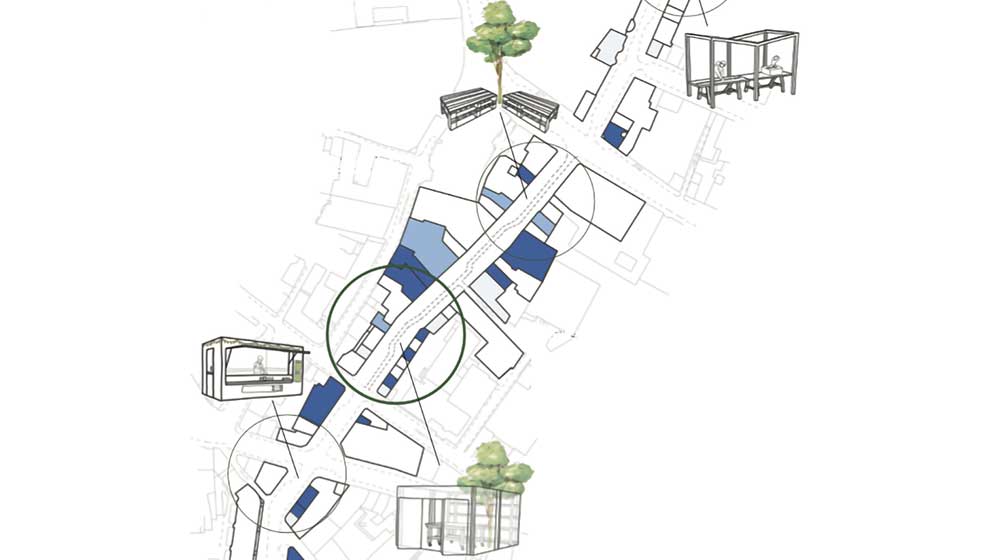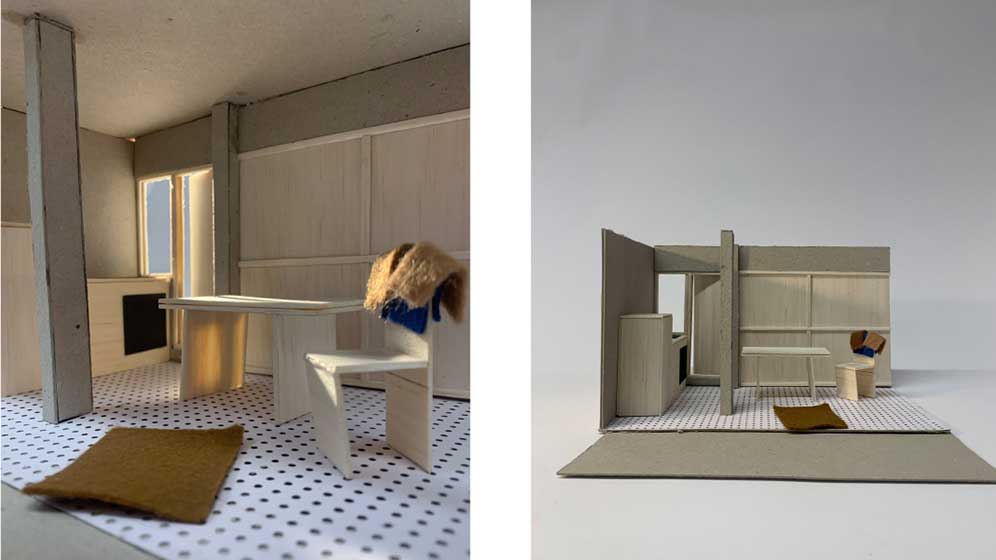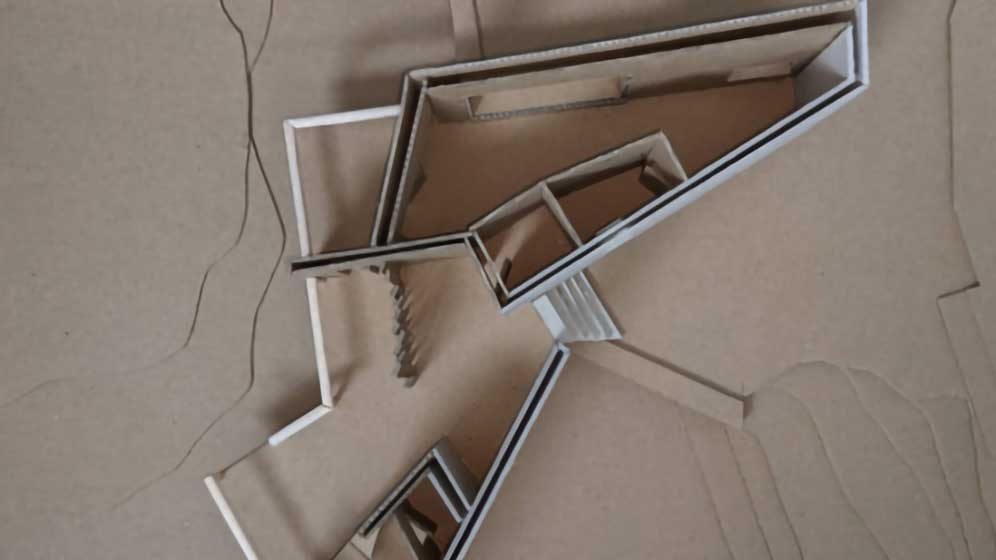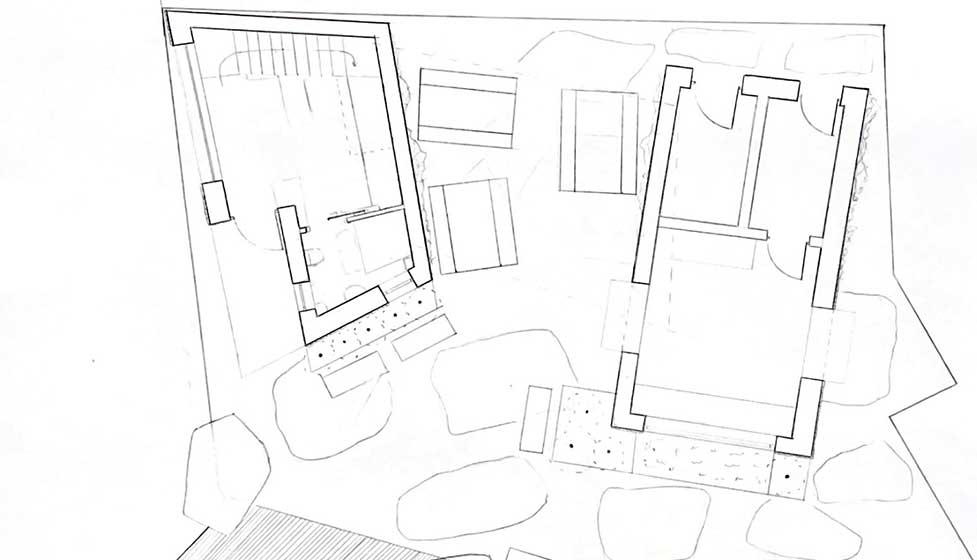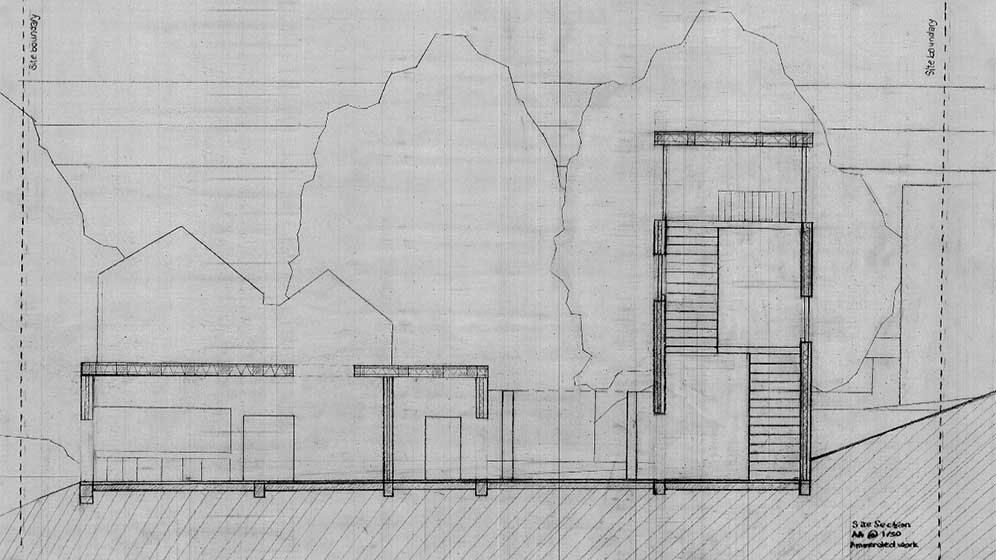Architecture and Urban Planning BA Honours
- UCAS code: K190
- Full time
- 3 years
Explore the world of architecture, urban design, landscape architecture and urban planning. With a focus on people and climate you'll gain expertise in the field of your choice, with routes to professional accreditation.
You are currently viewing course information for entry year: 2026
Next start date:
- September 2026
UCAS Institution name and code:
- NEWC / N21
Course overview
On our degree we'll help you find your career path in the built environment. Whether that's in architecture, urban design, urban planning, landscape architecture or other design-related professions.
Engage with the design processes and production of the architecture, urban spaces and landscapes that shape our lives.
Take inspiration from the work of innovative and radical designers and thinkers. Collaborate in the design of your environment and address climate change.
The programme includes modules spanning our research expertise in architecture, urban design, landscape architecture, urban planning and public participation in the built environment.
There are also optional modules in urban planning, sociology and geography.
Subject to choosing the required modules, we offer accredited pathways in Architecture or in Urban Design. Our Architecture pathway is accredited with the Architects Registration Board. Our Urban Design pathway is accredited with the Royal Town Planning Institute.
We also offer a route in Landscape Architecture via one year out in Landscape practice. This pathway facilitates entry onto a 1-year Master’s programme in Landscape Architecture (accredited by the Landscape Institute).
Your course and study experience - disclaimers and terms and conditions
Please rest assured we make all reasonable efforts to provide you with the programmes, services and facilities described. However, it may be necessary to make changes due to significant disruption, for example in response to Covid-19.
View our Academic experience page, which gives information about your Newcastle University study experience for the academic year 2025-26.
See our terms and conditions and student complaints information, which gives details of circumstances that may lead to changes to programmes, modules or University services.
Quality and ranking
Professional accreditation and recognition
All professional accreditations are reviewed regularly by their professional body.
Modules and learning
Modules
The information below is intended to provide an example of what you will study.
Most degrees are divided into stages. Each stage lasts for one academic year, and you'll complete modules totalling 120 credits by the end of each stage.
Our teaching is informed by research. Course content may change periodically to reflect developments in the discipline, the requirements of external bodies and partners, and student feedback.
Optional module availability
Student demand for optional modules may affect availability.
Full details of the modules on offer will be published through the Programme Regulations and Specifications ahead of each academic year. This usually happens in May.
To find out more please see our terms and conditions
Stage 1 will provide you with an exciting introduction to the history of architecture and cities, architectural design and technology, and urban planning with a focus on people and climate.
Through a varied series of design projects, workshops and visits, we'll introduce you to key design skills. You'll gain an understanding of scale and context and develop spatial imagination. You'll learn to communicate your ideas verbally and visually thanks to the varied input of design practitioners, artists and academics.
All modules in Stage 1 are compulsory and will invite you to explore the various fields that this programme offers.
Modules
Stage 2 is where you choose the direction of your degree.
If you want to choose one of the accredited pathways/routes at the end of Stage 2, you'll need to choose the group of three required modules:
- Relational Mapping, Design and Representation
- Living Communally and
- Participation: Theories and Practices
The design project in Relational Mapping will help you explore the scales of urban design and landscape architecture through an ecological lens.
Living Communally focuses on the architectural design of sustainable co-housing.
The interdisciplinary module Participation provides an introduction to participation concepts and methods, as well as an opportunity to design a participation project working with/alongside a community group representative.
Or, you can opt to build your own degree; choosing from a wide range of modules across subjects and interests such as design, urban planning, geography and sociology.
Modules
| Compulsory Modules | Credits |
|---|---|
| Alternative Practice: Theories and Practices | 20 |
| Visual and Creative Practice Research Skills | 20 |
Stage 3 is the culmination of the climate and socially engaged design practice ethos of the programme.
At Stage 3 you'll undertake a dissertation on a topic related to your interest.
This year offers a wide range of module options, from climate literacy to a live design project that allows you to put theory into practice by working with a local organisation or community group.
If you studied the group of three required modules in Stage 2, you can now choose which of the accredited pathways/routes to pursue; Architecture, Urban Design or Landscape Architecture.
Students taking the urban design pathway must opt for the approved modules during their studies, highlighted below:
- Green Infrastructure for Well-being and Biodiversity
- Strategies into Action: Planning
- Alternative Practice: Co-producing Space
- Development Management
Students taking the architecture pathway must opt for the approved modules during their studies, highlighted below:
- Green Infrastructure for Well-being and Biodiversity
- Climate Literacy: Philosophies to Practice
- Architectural Technology 2: Construction in Detail
- Alternative Practice: Co-producing Space
- Construction, Energy and Professional Practice
Students interested in landscape architecture are advised to choose the following modules:
- Green Infrastructure for Well-being and Biodiversity
- Climate Literacy: Philosophies to Practice
- Landscape Architecture Studio 1: City as Landscape
- Landscape Architecture Studio 2: Materiality of Landscape
Modules
| Compulsory Modules | Credits |
|---|---|
| Dissertation in Architecture, Urbanism and Landscape | 40 |
We base these figures and graphs on the most up-to-date information available to us. They are based on the modules chosen by our students in 2024-25.
Teaching time is made up of:
- scheduled learning and teaching activities. These are timetabled activities with a member of staff present.
- structured guided learning. These are activities developed by staff to support engagement with module learning. Students or groups of students undertake these activities without direct staff participation or supervision
Teaching and assessment
Teaching methods
This programme provides a mix of studio design projects and traditional teaching. A typical week will involve working in the studio, either in groups developing design projects or working independently.
Methods include:
- tutorials and support
- traditional lectures and seminars
- site visits and library-based research
- individual and group project work
Assessment methods
You'll be assessed through a combination of:
-
Assignments – written or fieldwork
-
Case studies
-
Dissertation or research project
-
Essays
-
Examinations – practical or online
-
Portfolio submission
-
Presentations
-
Projects
-
Reflective report/journal
-
Reports
Skills and experience
Practical skills
You'll learn about the design process through a series of design projects. You'll gradually develop your architectural thinking, skills and knowledge working in our well-equipped studios.
You'll also gain an understanding of architectural design through working with drawing and model-making in Stage 1, and Adobe Suite and CAD software in Stage 2.
In Stage 3 you'll have the chance to participate in a live community project, seeing theory put into practice.
Opportunities
Accredited Pathways
If you have chosen to pursue an accredited pathway/route, upon completion of Stage 3 you will proceed in the following way, depending on the route chosen:
Architecture pathway
You will proceed to study for a final year (Stage 4) to achieve the Architects Registration Board Part I accreditation in the form of the Master of Architecture and Urban Planning (Architecture) degree.
During that year you will further your knowledge into climate design and action, as well as construction, material, architectural design and professional practice.
Urban Design pathway
You will take a placement year in a planning office to achieve the Certificate in Planning Practice. Upon completion of this paid year in industry, you will return to Newcastle to study for a final year to achieve the Royal Town Planning Institute accreditation in the form of the Master of Architecture and Urban Planning (Urban Design) degree.
During this final year of study, you will engage in understanding urban transformation and urban design in existing contexts and areas of regeneration.
Landscape Architecture route
You will take a year out in a landscape practice, this year in industry will then provide you with the opportunity to join the Stage 2 Master in Landscape Architecture at Newcastle for a final year of study which will award you with the Landscape Institute accreditation in the form of the Master of Landscape Architecture.
During this year, you will acquire specialist knowledge in such areas as site-planning, land modelling, landscape construction, planting design as well as engage in contemporary issues including the climate crisis, social justice and rapid urbanisation.
Facilities and environment
Facilities
As an Architecture and Planning student, you will split your time between our dedicated Architecture building and the newly refurbished Henry Daysh Building.
You will have access to a fully equipped analogue workshop and casting space as well as state-of-the-art digital fabrication facilities, including:
- 3D printers
- a CNC router
- laser cutters
Design studios
Our design studios include CAD facilities and drawing boards and are dedicated to use by BA Architecture & Urban Planning students.
Other facilities
You will also benefit from:
- Archiprint facilities
- 5x A0 Printers
- 2 x A0 scanners
- A3 scanners available in studio rooms
- student-run coffee bar providing a social space for you to meet with staff and fellow students
You will collaborate with artists and engineers to test design ideas at 1:1 scale, and explore alternative forms of practice with community projects.
Find out more about our facilities.

Support
Parenting scheme
This scheme aims to help you adapt to student life and get the most out of your time here by putting you in contact with current undergraduate students who can share their knowledge and experiences.
Dedicated Student Support Co-ordinator
This key staff member offers support if you are experiencing particular issues that are affecting your performance whilst at University.
You can discuss confidential problems with them and receive relevant support and advice. They will also offer guidance about other University services that may be of benefit.
Your future
Developing your employability
We will help you to develop a range of transferable skills that employers look for in new graduates. These skills have helped graduates find employment in numerous fields such as:
- urban design
- landscape architecture
- property development
- construction management
- urban planning
Make a difference
Sorry, you need JavaScript to view this video
Careers support
Our Careers Service is one of the largest and best in the country, and we have strong links with employers. We provide an extensive range of opportunities to all students through our ncl+ initiative.
Visit our Careers Service website
Recognition of professional qualifications outside of the UK
If you’re studying an accredited degree and thinking about working in Europe after you graduate, the best place to find current information is the UK Government’s guidance on recognition of UK professional qualifications in EU member states. This official resource explains whether your profession is regulated in another country, what steps you need to take, and which organisation you should contact.
Additional information
The Route to Royal Town Planning Institute Accreditation
The route to receiving Royal Town Planning Institute accreditation is a 5-year programme. Beginning with the BA (Hons) Architecture and Urban Planning degree, followed by the Certification of Planning Practice and concluded by the MA in Urban Design. To qualify for this accreditation students must opt for the RTPI approved modules during their studies. These RTPI approved modules are specified in the module and learning section.
Students taking the RTPI pathway will receive full accreditation from the Royal Town Planning Institute.
If you graduate from this degree with a 2:2 or above, you'll automatically receive an offer to the following programmes:
- Urban Design MA
- Master of Landscape Architecture MLA
- Urban Planning MSc
Transfer opportunities
This wide-ranging degree opens up a great variety of career paths in the built environment. However, we understand that you may not yet be sure exactly where your architectural/planning interests lie. If you have acquired the relevant skills in Stage 1, you may be eligible to transfer to another similar degree within the School if you find your interests change, such as:
- Urban Planning BA Honours degree
- Master of Planning MPlan degree
Work placement
Get career ready with a work placement and leave as a confident professional in your field. You can apply to spend 9 to 12 months working in any organisation in the world, and receive University support from our dedicated team to secure your dream placement. Work placements take place between stages 2 and 3.
You'll gain first-hand experience of working in the sector, putting your learning into practice and developing your professional expertise.
If you choose to take a work placement, it will extend your degree by a year, and your degree title will show you have achieved the placement year. A work placement is not available if you're spending a year studying abroad. Placements are subject to availability.
Find out more about work placements
Study abroad
Experience life in another country by choosing to study abroad as part of your degree. You’ll be encouraged to embrace fun and challenging experiences, make connections with new communities and graduate as a globally aware professional, ready for your future.
In Stage 2 you can choose to spend a whole semester studying in Europe as part of a study abroad exchange.
Entry requirements
All candidates are considered on an individual basis and we accept a broad range of qualifications.
The entrance requirements and offers below apply to 2026 entry.
| A-Level | |
|---|---|
| International Baccalaureate | |
|---|---|
Other UK and the Republic of Ireland qualifications
Alternative offers at Newcastle
Through one of our contextual or alternative offer routes, you could receive an offer of up to three grades lower than the typical requirements.
Contextual offers
We use certain contextual data from your UCAS form, alongside your application, to consider challenges that you may have faced in your education and the potential effect this may have had on your qualifications. This means you may be eligible to receive a lower contextual offer.
PARTNERS offers
One of the largest and longest support entry routes to university of its kind for students from underrepresented backgrounds. We support applicants from application through to study.
Realising Opportunities offers
A unique programme delivered in collaboration with 10 leading, research-intensive universities in the UK. The programme is open to students in Year 12/first year of college.
Pathways to Newcastle offers
Pathways to Newcastle, our national skills entry route, is available for specific subject areas.
High Performance Athletes
We support promising athletes at the application stage, who compete in regional, national or international levels in their sport.
Qualifications from outside the UK
English Language requirements
Entrance courses (INTO)
International Pathway courses are specialist programmes designed for international students who want to study in the UK. We provide a range of study options for international students in partnership with INTO.
These courses are specifically designed for international students who want to study in the UK and progress onto one of our undergraduate degrees. Our International Study Centre, has a range of study options including:
- International Foundation
- International Year One
- English Language courses
Find out more about International Pathway courses
Admissions policy
This policy applies to all undergraduate and postgraduate admissions at Newcastle University. It is intended to provide information about our admissions policies and procedures to applicants and potential applicants, to their advisors and family members, and to staff of the University.
University Admissions Policy and related policies and procedures
Credit transfer and Recognition of Prior Learning
Recognition of Prior Learning (RPL) can allow you to convert existing relevant university-level knowledge, skills and experience into credits towards a qualification. Find out more about the RPL policy which may apply to this course.
Tuition fees and scholarships
Tuition fees for academic year 2026-2027
The 2026 entry home fees have not yet been confirmed.
| Qualification: BA Honours | |
|---|---|
|
Home students full time 3 years |
Tuition fees (Year 1)
Not set |
|
International students full time 3 years |
Tuition fees (Year 1)
26,750 |
Year abroad and additional costs
For programmes where you can spend a year on a work placement or studying abroad, you will receive a significant fee reduction for that year.
Some of our degrees involve additional costs which are not covered by your tuition fees.
Scholarships
Find out more about:
Open days and events
You'll have a number of opportunities to meet us throughout the year at our on-campus and virtual open days.
You'll be able to:
- explore our beautiful campus
- find out about our vibrant city
- discover what students think about studying at Newcastle
You'll also have the opportunity to speak to academic staff and find out more about the subjects you're interested in.
Find out about how you can visit Newcastle in person and virtually.
We regularly travel overseas to meet with students interested in studying at Newcastle University. Visit our events calendar to find out when we're visiting your region.
How to apply
Apply through UCAS
To apply for undergraduate study at Newcastle University, you must use the online application system managed by the Universities and Colleges Admissions Service (UCAS). All UK schools and colleges, and a small number of EU and international establishments, are registered with UCAS. You will need:
- the UCAS name and institution codes for Newcastle University (NEWC/N21)
- the UCAS code for the course you want to apply for
- the UCAS 'buzzword' for your school or college
If you are applying independently, or are applying from a school or college which is not registered to manage applications, you will still use the Apply system. You will not need a buzzword.
Apply through UCASApply through an agent
International students often apply to us through an agent. Have a look at our recommended agents and get in touch with them.
Get in touch
By phone
Call us on +44 (0) 191 208 3333 and press option 1. Our opening hours are Monday to Friday 10am until 4pm.
Live chat
Our NCL chatbot might be able to give you an answer straight away. If not, it’ll direct you to someone who can help.
You'll find our NCL chatbot in the bottom right of this page.
Online
Chat to our students
Choosing a university is a big decision. If you've got questions about a particular course, student life or the city of Newcastle, why not chat to our friendly students or graduates!
Keep updated
We regularly send email updates and extra information about the University.
Receive regular updates by email